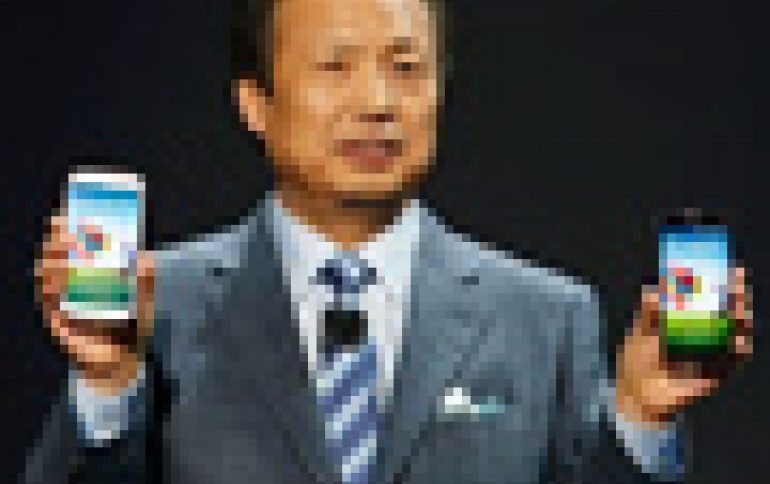
Samsung Could Eclipse Android Universe
Samsung's Galaxy SIV is packed full of native apps and Samsung-specific features, showing off Samsung's ability to leverage the Android bones to make a stronger overall device that is bigger than its parts.
The South Korean's latest Android flagship was launched late on Thursday evening and its full tech specs, appearance and revolutionary features.
According to research by analyst Benedict Evans, Samsung 'Galaxy' has become a more popular search term than Android for web users searching for information about Android-powered smartphones. The concern is that Samsung's success is making it so powerful that it could dictate the future direction of Android, or abandon it altogether.
The Galaxy SIV features an array of impressive features that will not be available to users of any other Android device, such as smart scrolling -- a feature that tracks head and eye position so that text automatically moves up or down the screen -- and a gesture interface that can understand hand movements above the screen as well as touches applied to the display's surface. These, and other technologies such as voice recognition are built into the Samsung software layer that sits on top of the Android operating system. All these features are obviously not part of Android's app ecosystem available to anyone.
Of course, soon there will be another iPhone announcement and the hype will turn back to Cupertino. More than anything, the challenge Samsung presents with the combination of the S 4 and Note II is a product line that raises the cost of entry. They embedded a significant number of software features in a device with strong technical specifications that is eclipsing the Android infrastructure on which it's built.
Samsung's feature-packed Galaxy S4 is expected to put pressure on Apple to accelerate its pace of smartphone design as Samsung's latest flagship smartphone out-does the iPhone in most technical aspects.
Until now, Apple released a new phone every second half of a year. And the iPhone has gotten a complete redesign only every two years.
A day before Samsung's launch, marketing chief Phil Schiller attacked Google's Android operating system, in an interview with Reuters. He said that the majority of Samsung's users were stuck on older versions and that Apple's internal research showed four times as many consumers were switching to iOS from Android than vice versa.
According to research by analyst Benedict Evans, Samsung 'Galaxy' has become a more popular search term than Android for web users searching for information about Android-powered smartphones. The concern is that Samsung's success is making it so powerful that it could dictate the future direction of Android, or abandon it altogether.
The Galaxy SIV features an array of impressive features that will not be available to users of any other Android device, such as smart scrolling -- a feature that tracks head and eye position so that text automatically moves up or down the screen -- and a gesture interface that can understand hand movements above the screen as well as touches applied to the display's surface. These, and other technologies such as voice recognition are built into the Samsung software layer that sits on top of the Android operating system. All these features are obviously not part of Android's app ecosystem available to anyone.
Of course, soon there will be another iPhone announcement and the hype will turn back to Cupertino. More than anything, the challenge Samsung presents with the combination of the S 4 and Note II is a product line that raises the cost of entry. They embedded a significant number of software features in a device with strong technical specifications that is eclipsing the Android infrastructure on which it's built.
Samsung's feature-packed Galaxy S4 is expected to put pressure on Apple to accelerate its pace of smartphone design as Samsung's latest flagship smartphone out-does the iPhone in most technical aspects.
Until now, Apple released a new phone every second half of a year. And the iPhone has gotten a complete redesign only every two years.
A day before Samsung's launch, marketing chief Phil Schiller attacked Google's Android operating system, in an interview with Reuters. He said that the majority of Samsung's users were stuck on older versions and that Apple's internal research showed four times as many consumers were switching to iOS from Android than vice versa.





















